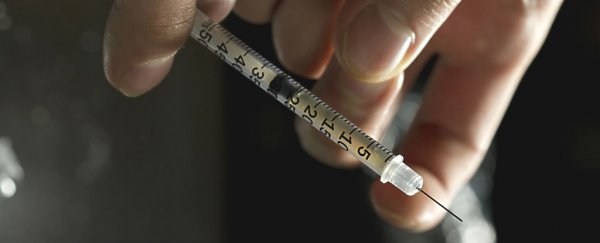Believed to be cooked up in labs in China before being sold to distributors online, a new drug called W-18 is said to be 10,000 times more powerful than morphine, and it's just been detected in the US and Australia.
Thought to be a synthetic opiate - similar to heroin but a whole lot stronger - W-18 is untraceable in a person's blood and urine, because there are currently no tests that target the drug.
"Whenever this drug starts circulating on the streets you're going to have deaths," Sacramento-based forensic chemist Brian Escamilla told the Calgary Sun.
First developed by researchers at the University of Alberta in Canada more than three decades ago, W-18 was originally intended to be a more effective but less addictive painkiller.
As The Washington Post reports, the formula was patented in the US and Canada in 1984, but because of its insane potency, no pharmaceutical company would touch it, so it faded into obscurity.
But a chemist in China got their hands on it, and took the synthetic opiate from potential medical treatment to a cheap, toxic, and not-yet-illegal high.
The first signs of W-18s reemergence cropped up in Canada in 2015, when police seized 110 pills in a drug raid, some of which contained the substance.
The drug has been compared to fentanyl - a newly developed opiate that's been linked to 655 deaths in Canada between 2009 and 2014 - except W-18 is estimated to be 100 times more powerful.
"We believe W-18 would be coming from China," Martin Schiavetta, a staff sergeant with the Calgary Police Service Drug Unit, told VICE. "Certainly organised crime is behind the importation of fentanyl, and I would make the connection that W-18 would be the same."
While Sweden made the drug illegal back in January, the US, Canada, and Australia are still figuring out how they want to deal with it.
Katie Mettler from The Washington Post reports:
"Then more than 1.1 kilograms of W-18 was discovered in the home of a Florida man, who was sentenced to 10 years in federal prison after he plead guilty to smuggling fentanyl from China, reported the Sun Sentinel. He faced no charges for possessing the W-18, however, because it's not yet illegal in the US.
Last week, Health Canada's Drug Analysis Service confirmed that 4 kilograms of a chemical powder seized in a fentanyl investigation in December 2015 was indeed the W-18 drug."
What's most concerning to medical experts is the fact that because pharmaceutical companies weren't interested it, the effects of W-18 have only properly been tested on mice.
As David Kroll reports for Forbes, a graduate student who once worked on the drug said that when they injected mice with W-18, using similar doses to aspirin, "the mice stood up for about a minute and fell over unconscious. They remained unconscious - for five days".
When they woke up, "they seemed fine, other than being really hungry and thirsty", Kroll says.
Right now, no one really knows what W-18 does to humans, how addictive it is, or what potential side effects it could have. In fact, while experts have estimated its potency in comparison to heroin and fentanyl, the reality is we haven't had any proper scientific data on the substance since the 80s.
"We have no data on absorption, distribution, metabolism, or excretion of the substance. We do not know on what specific receptors W-18 acts. We know nothing about receptor binding affinities. We know nothing of the acute effects of the substance," toxicologist-run blog, Dose Makes The Poison, reports.
Right now, Australian authorities aren't all that concerned. As The Sydney Morning Herald reports, while the Australian Crime Commission is aware that it's been detected in Australia, they say there's little evidence it's 'taken off' on the streets.
"It's certainly available for Australian consumers to order but we've never really seen a big uptake of any of the new opioids in Australia, with consumers seeming to prefer the more traditional licit and illicit opioids," said NDARC research officer Joe Van Buskirk, adding that once people get a whiff of how toxic this stuff is, they tend to opt for more 'tried and tested' drugs.
Meanwhile, in the US, there are reports that while the government is figuring out how to handle W-18, it's being cut with heroin and cocaine and distributed in Philadelphia.
